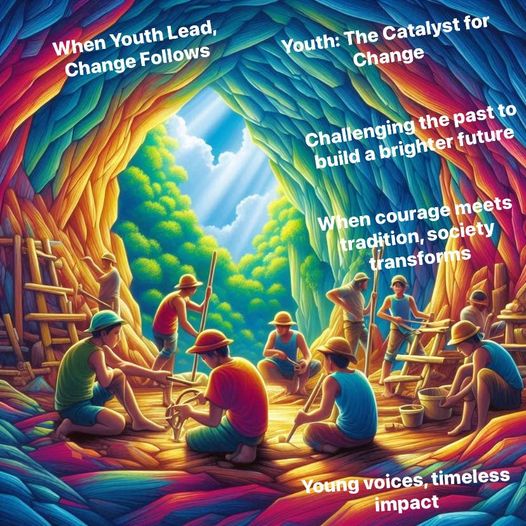
In most societies, youths are the largest demographic. They are often the ones who embrace new ideas and innovations, while many older individuals cling to traditional and old ideologies. When a new concept emerges with valid reasons for change, it is typically the youth who are the first to accept and adopt it. However, older generations are generally slower to understand and accept new ideas.
In the ancient kingdom of Aeloria, where traditions dictated every aspect of life, a group of courageous youths began to question the status quo. Elara and her friends—Aiden, Mike , Raj, Ali, Thane, and Nia—believed in progress and individual thought, inspired by tales of innovation from distant lands. They envisioned a future where their society could thrive through new ideas alongside their cherished customs.
As their ideas gained popularity among the younger generation, the Council of Elders, fearful of losing their authority, accused them of sowing discord and undermining tradition. Despite Elara’s eloquent defense of their vision, the elders decreed their exile, hoping to stifle the growing movement for change.
Banished to a remote cave in the mountains, the youths continued to develop their ideas, creating a small, thriving community based on equality and innovation. Over time, their success quietly inspired the people of Aeloria, who began to see the value in their progressive thinking.
Years later, a series of disasters struck Aeloria, revealing the limitations of the old ways. In desperation, the people sought the wisdom of the exiled youths. When Elara and her friends returned, they were welcomed as heroes, bringing new methods and a collaborative spirit that revitalized the kingdom.
The story of these brave youths, much like the tale of the Seven Sleepers from the Biblical tradition and the Quran—where a group of young believers followed Jesus and rejected the polytheistic traditions of their forefathers, seeking refuge in a cave to escape persecution, and were miraculously preserved by God for centuries before being brought back to life (See Qur’an 18:9-19)—underscores the timeless truth that the courage to challenge the old traditions and embrace the future can lead to profound societal transformation. Their legacy became a symbol of hope, teaching that true strength lies in balancing respect for tradition with the courage to reimagine the future of the society.
In many societies, the politicians who hold the reins of power are often much older and deeply entrenched in the established ways of governance and tradition. This generational gap leads to a significant disconnect between these leaders and the fresh, innovative ideas that the youth bring forth. Consequently, young people, brimming with new perspectives and solutions for contemporary challenges, frequently find their voices marginalized or outright rejected by these seasoned politicians. The resistance stems from a fear of change and a reluctance to deviate from long-standing practices, stifling progress and alienating the very demographic that holds the potential to drive future growth and development.

